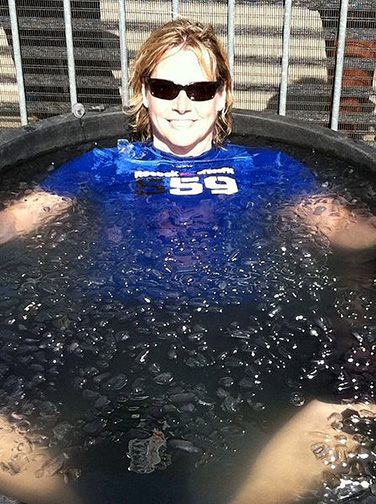Sep 29, 2021The Science Behind Cold Water Immersion & Muscle Recovery
Spending five or 10 minutes in cold, icy water has been thought to improve muscle recovery and enhance future athletic performance.
This practice, commonly referred to as cold water immersion or ice baths, is routinely used by athletes ranging from the professional ranks all the way down to the high school level.
But what is the science behind cold water immersion and its effects on muscle recovery? A recent article from ScienceAlert.com spoke with five experts in exercise physiology to find out.
Below is an excerpt from that article.
 Many people use ice packs or a bag of frozen peas at home to reduce pain and swelling if they have pulled a muscle.
Many people use ice packs or a bag of frozen peas at home to reduce pain and swelling if they have pulled a muscle.
Johanna Lanner, an expert in muscle physiology from the Karolinska Institute in Sweden, explains how this works:
“Cooling i) reduces nerve impulse transmission and thus reduces the level of pain perception and ii) induces constriction of blood vessels in peripheral tissues (e.g., muscle) which results in reduced fluid diffusion that may assist in reducing exercise-induced acute inflammation.”
Llion Roberts, an expert in exercise physiology from Griffith University in Australia, says: “Cold water immersion is also known to help restore heart rate variability, the variation in the millisecond time periods between successive heartbeats.”
Interestingly, ice baths can influence our minds as well as our muscles. James Broatch, an expert in exercise physiology from Victoria University in Australia, undertook a research study which compared “the effects of an ice bath with a placebo condition that participants were tricked into thinking was as effective as an ice bath”.
Lanner says that ice baths are effective at “reducing the symptoms of exercise-induced delayed onset muscle soreness i.e., pain and stiffness experienced in muscles several hours to days (usually 24-72 hours) after unaccustomed or strenuous exercise.”
Christopher Mawhinney, an expert in sports science from Mahidol University in Thailand, says: “Interestingly, there is evidence which suggests that cooling the exercised muscle increases the cellular signal which turns on mitochondrial biogenesis”.
Mitochondrial biogenesis is when cells increase their numbers of mitochondria, which are structures that release energy. Mitochondrial biogenesis is one of the positive effects that come from endurance training, so ice baths could help to amplify this benefit.
The effects of ice baths on exercise performance differ depends on what kind of exercise is involved.
» ALSO SEE: Study Suggests Month-Long Recovery Time for Concussions
Rogers summarizes: “Cold water immersion following strength exercise should be undertaken with caution or avoided. Its use following one-off circumstances like big sports events or endurance exercise is recommended, and may even provide additional benefits for subsequent endurance exercise performance.”
The takeaway: Don’t use ice baths to improve your strength training, but they could be useful for endurance exercises.
To read the full article on cold water immersion from ScienceAlert.com, click here.


